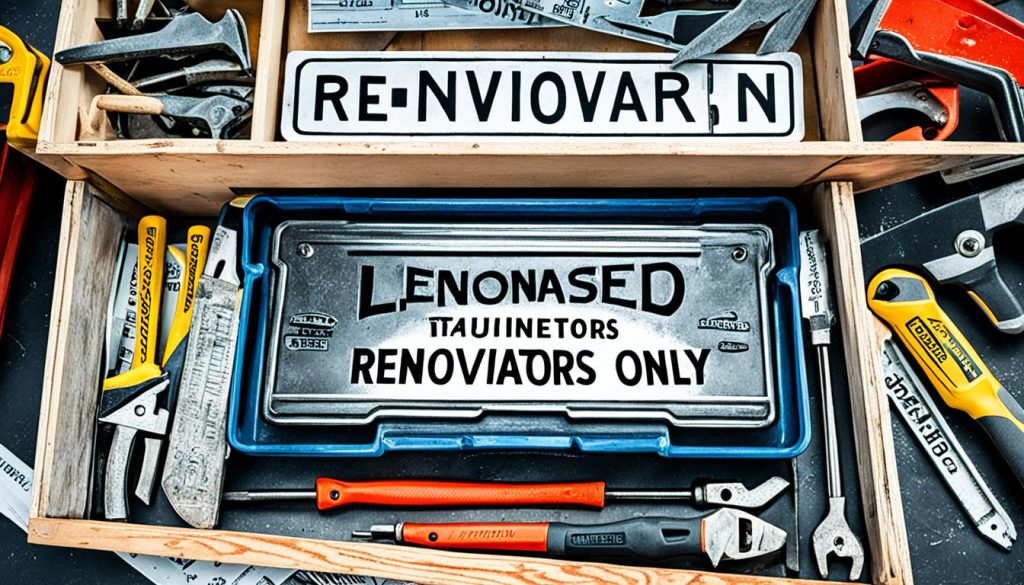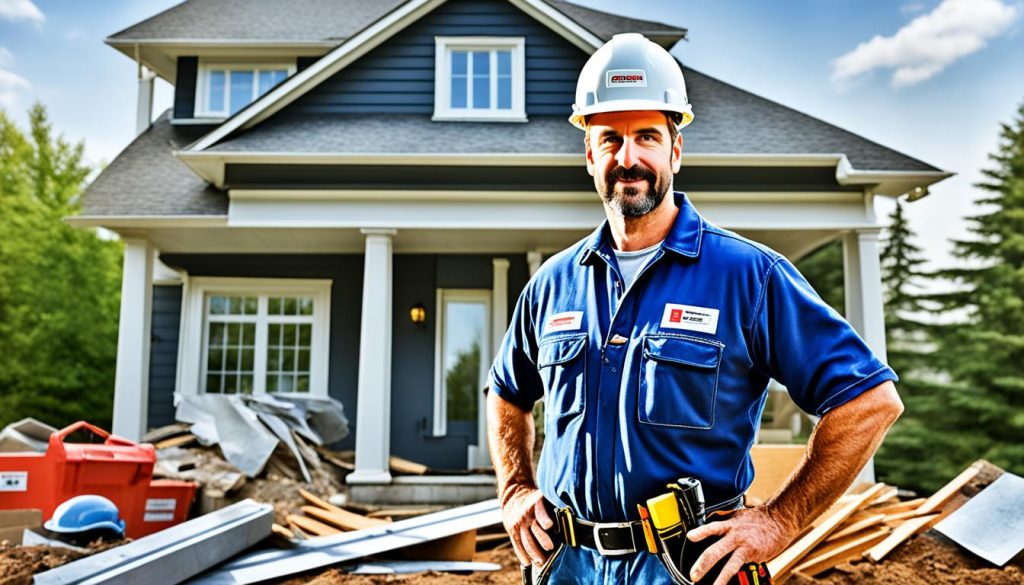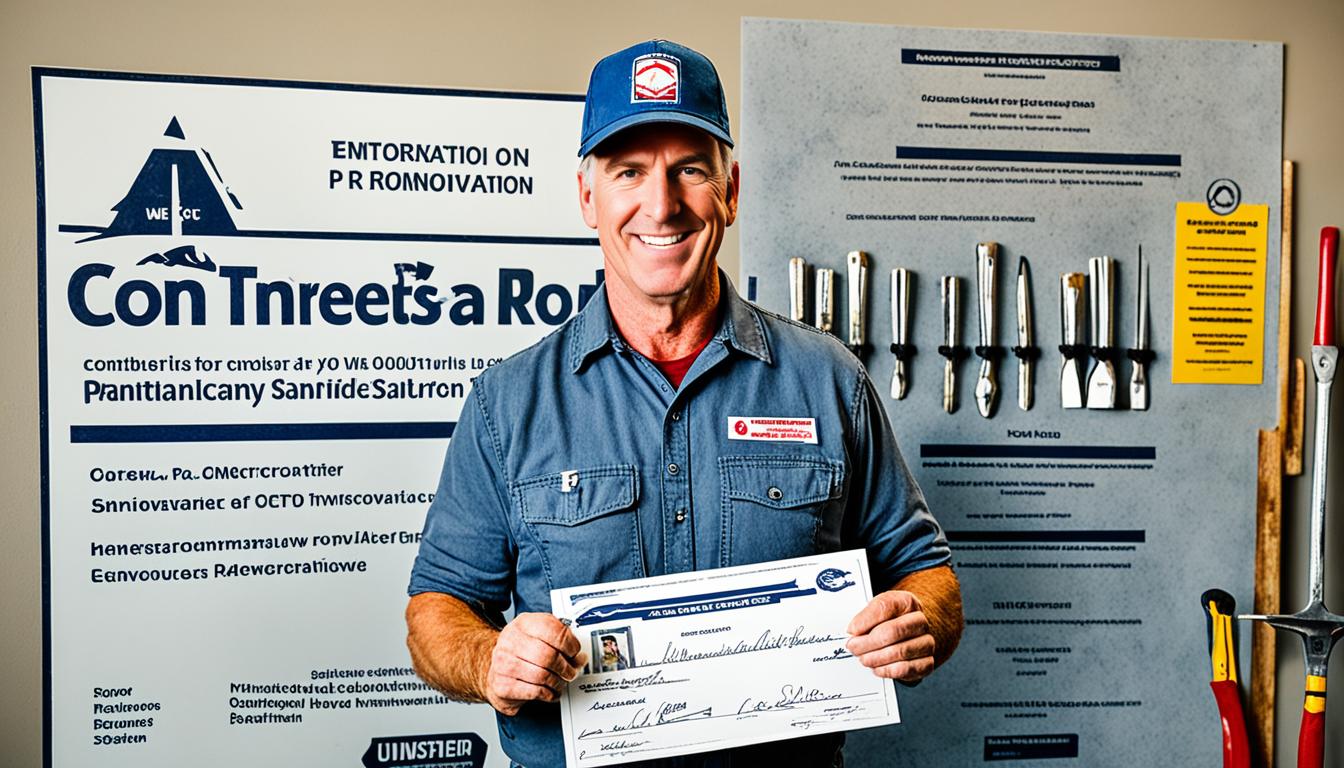Did you know that in Ontario, a license is required for businesses that provide services to repair or renovate buildings and structures? Whether you’re planning to remodel your home or start a renovation business, understanding the licensing requirements is crucial.
Key Takeaways:
- Obtaining a license for renovation services is mandatory in Ontario.
- Applicants must be at least 18 years old and meet certain identification requirements to apply for a license.
- The application process involves submitting necessary documents and paying applicable fees.
- Renewal of licenses is required annually with corresponding fees.
- Having a license ensures credibility and compliance with safety regulations.
Hiring a Contractor
When it comes to home renovations, hiring a contractor is a crucial step in ensuring a successful and stress-free project. But with so many options out there, how do you choose the right one? Here are some tips to help you make an informed decision:
- Make a list of desired renovations: Before hiring a contractor, it’s important to have a clear idea of what you want to achieve with your renovations. Write down your goals and specific requirements to effectively communicate them to potential contractors.
- Set a budget: Determine how much you’re willing to spend on the project. Having a budget in mind will help you narrow down your options and prevent overspending.
- Seek recommendations: Reach out to friends, family, and neighbors who have recently undertaken similar projects. Their firsthand experiences and recommendations can help you find reliable contractors.
- Verify workplace safety and insurance coverage: It’s essential to ensure that the contractor and their workers have proper workplace safety training and insurance coverage. This protects you from any liability in case of accidents or property damage.
- Look for certification from Skilled Trades Ontario: Contractors with certifications from Skilled Trades Ontario demonstrate their commitment to professionalism and quality workmanship.
- Consider local contractors: Hiring a local contractor offers several advantages. They are often more accessible for follow-up work and can provide local references that you can easily verify.
- Obtain written estimates: Get written estimates from at least three contractors to compare prices, services, and timelines. Avoid accepting estimates over the phone or without a thorough inspection of the project area.
- Ask questions: Don’t hesitate to ask questions about the contractor’s experience, previous projects, and their process. Clear communication will help you gauge their professionalism and expertise.
- Avoid deals that sound too good to be true: Be cautious of contractors offering significantly lower prices or making unrealistic promises. If it sounds too good to be true, it probably is.
- Consider hiring an architect or engineer: For major renovation projects that require structural changes, involving professionals such as architects or engineers can help ensure the safety and feasibility of the design.
- Check for necessary permits: Some renovation projects require building permits. Make sure to inquire about the necessary permits and ensure that the contractor takes care of the legal requirements.
By following these tips, you can hire a contractor with confidence, knowing that they are equipped to handle your project professionally and deliver the desired results.
Ontario Renovations and Licensing
In Ontario, it is essential for tradespeople to have specific certifications and qualifications to legally practice certain trades. The Ontario College of Trades is responsible for regulating skilled trades and ensuring that compulsory trades meet the necessary standards. As a tradesperson, you can showcase your certifications by registering with the Ontario College of Trades. Additionally, the Electrical Safety Authority/Electrical Contractor Registration Agency provides licenses to licensed electricians, gas/oil technicians, plumbers, and refrigeration and air conditioning mechanics.
The journey towards becoming a licensed tradesperson in Ontario involves various milestones. Certificates of Apprenticeship and Certificates of Qualification are awarded to recognize the expertise and skills of tradespeople. For those from outside of Ontario, the Trade Equivalency Assessment offers the opportunity to become qualified to work in the province. Furthermore, the prestigious Red Seal certification authorizes tradespeople to practice both in Ontario and interprovincially.
Trades falling under the category of compulsory trades require specific certifications or registrations. It is important for tradespeople in these fields to obtain the necessary qualifications to practice legally. By adhering to the licensing requirements set by the Ontario College of Trades and obtaining the relevant certifications, tradespeople can demonstrate their commitment to upholding the professional standards of their trade.

- Tradespeople in Ontario must possess the necessary certifications and qualifications to legally practice certain trades.
- The Ontario College of Trades regulates skilled trades and ensures compliance with the required standards.
- Registration with the Ontario College of Trades allows tradespeople to showcase their certifications.
- The Electrical Safety Authority/Electrical Contractor Registration Agency provides licenses to specific trades, such as licensed electricians and gas/oil technicians.
- Certificates of Apprenticeship and Certificates of Qualification recognize the skills and expertise of tradespeople.
- The Trade Equivalency Assessment offers the opportunity for tradespeople from outside of Ontario to become qualified to work in the province.
- The Red Seal certification authorizes tradespeople to practice in Ontario and interprovincially.
- Compulsory trades, such as licensed electricians, gas/oil technicians, plumbers, and refrigeration and air conditioning mechanics, require specific certifications or registrations.
Additional Licensing Requirements
In addition to the licensing requirements set by the Ontario College of Trades, there may be additional licensing requirements imposed by various municipalities for specific trades. For instance, in Toronto, businesses that alter, repair, or renovate buildings or structures must obtain a building renovator license in compliance with Toronto bylaws.
Obtaining these municipal licenses often entails providing further documentation and undergoing inspections to ensure compliance with local regulations. Moreover, certain renovation projects may require building permits to be obtained to ensure compliance with safety standards and zoning requirements.
When undertaking home renovations or repairs, it is crucial to have a written contract in place with the contractor. This contract should clearly outline the scope of work, timelines, and payment terms. To protect oneself, it is advisable to keep down-payments to a minimum and make subsequent payments only after the completion of the agreed-upon work. Additionally, it is essential to address provisions for dispute resolutions within the contract.
Before engaging a contractor, it is wise to request references and check their reputation and experience. Verifying the warranties and guarantees offered by the contractor is also necessary to ensure adequate protection. Avoiding cash deals and considering financing options carefully can provide added financial security and flexibility throughout the renovation process.

Being Informed and Accountable
As a consumer, it is essential to be well-informed about your rights and responsibilities when undertaking a home renovation project. Holding tradespeople accountable and ensuring their accountability is a crucial aspect of the process. In Ontario, the Ontario College of Trades is responsible for investigating public complaints and enforcing regulations to ensure the competency of tradespeople. Their complaint and incident processes provide consumers with a channel to address any concerns or issues they may encounter.
Certifications and qualifications are vital indicators of a tradesperson’s expertise and reliability. It is important to verify if a tradesperson is properly certified and qualified for the specific project you require. This helps ensure that they possess the necessary skills and knowledge to deliver quality workmanship. Additionally, consumers in Ontario are protected by the Consumer Protection Act, which outlines their rights and safeguards them against unscrupulous practices.
To safeguard against potential home renovation scams, it is advisable to thoroughly check references and explore the contractor’s reputation. Requesting references and verifying their authenticity can provide valuable insights into the contractor’s reliability and the quality of their previous work. It is also crucial to ensure that all necessary paperwork, such as contracts and permits, is in place before commencing any work.
By staying informed about consumer protection acts and being proactive in checking references and qualifications, consumers can protect themselves from fraudulent practices. It is important to be aware of cooling-off periods, cancellation policies, and other legal safeguards when signing contracts for work conducted in the home. By taking these precautions and holding tradespeople accountable, consumers can make informed decisions and achieve successful home renovation projects.

Leave a Reply
You must be logged in to post a comment.